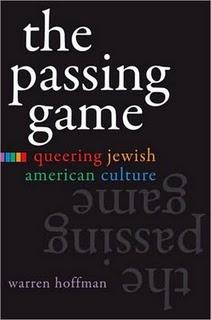The Passing Game: Queering Jewish American Culture

Once homosexuality has been fully incorporated and accepted into “mainstream” society, I wonder what group will be placed at the bottom of the totem pole. I use the word incorporated because it symbolizes a capitalistic tolerance without a desire or need to understand a person's totality. What makes this subject matter doubly difficult is when being part of one group becomes the default for another.
In The Passing Game, Warren Hoffman explains how the term homosexuality was coined at the very same moment in history as anti-semitism, how the stereotypes of Jews from 1880 to 1920 included homosexuality, and how synonymous Jew and queer were at that time. Hoffman’s first example is the Yiddish play Got fun nekome (God of Vengeance) by Sholem Asch, which first appeared in 1907 and depicted prostitution and homoerotic female love. When the English version of the play was performed on Broadway in 1923, it caused a scandal, in which the entire cast was arrested and found guilty for performing an immoral drama. The issue of homosexuality was virtually non-existent and non-recognized by wider audiences in 1907, but Hoffman shows that the uproar in 1923 indicated a shift in thought on sexuality between 1907 and 1923.
Further along the book, Hoffman focuses on the term queer and its association outside of a sexual context. In the 1946 publication of Wasteland by lesbian writer Jo Sinclair (Ruth Seid), Hoffman explores the way in which this term is used in a non-sexual context, but still somehow tied to sexuality. The main character, Jake Braunowitz, is a second-generation heterosexual Jewish American, who is ashamed and embarrassed to be Jewish. Debbie is Jake’s sister, who learns through her psychiatrist to accept her lesbian identity. Jake seeks the help of this same psychiatrist, and learns that by accepting his sister as queer, he can also accept his Jewish identity.
In Hoffman’s examination of Got fun nekome (God of Vengeance) and Sinclair’s Wasteland, as well as his study of cross-dressing and gender ambiguity in short stories, shows how queerness can be related to subject matter outside the context of sexuality. For example, Hoffman analyzes how the feminization of the Jewish male has shaped many Jewish men and women as they have been forced to deal with their own sexuality.
Readers of Hoffman's work may realize how anything that deviates from the mainstream culture and society, be it, culturally, “racially”, or religiously, can be considered abnormal. The Passing Game reminds us why these predominant cultural and societal mores should be changed by any means necessary.